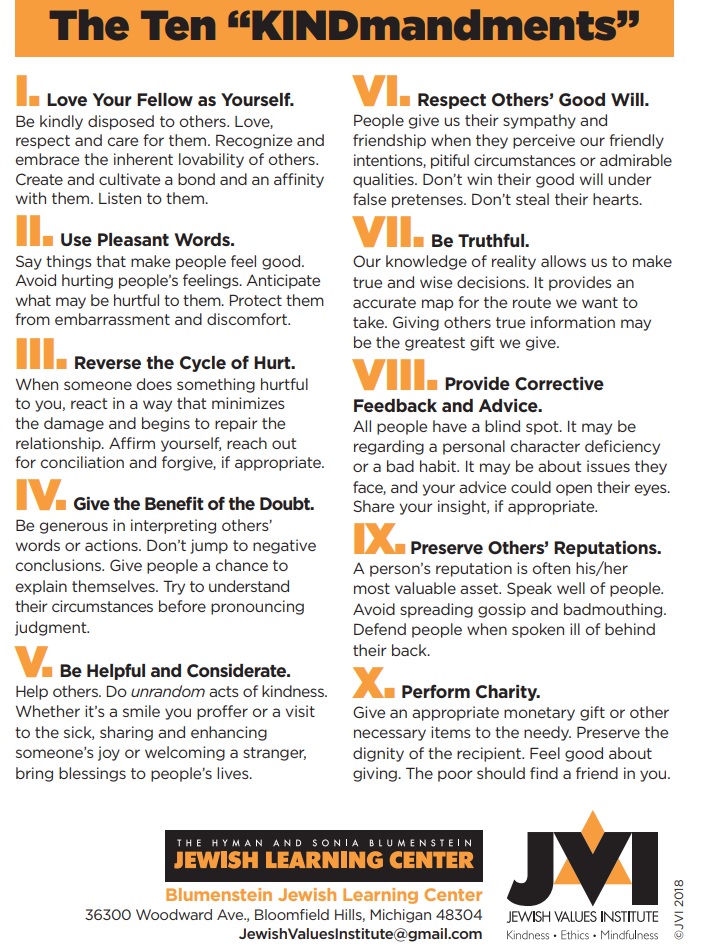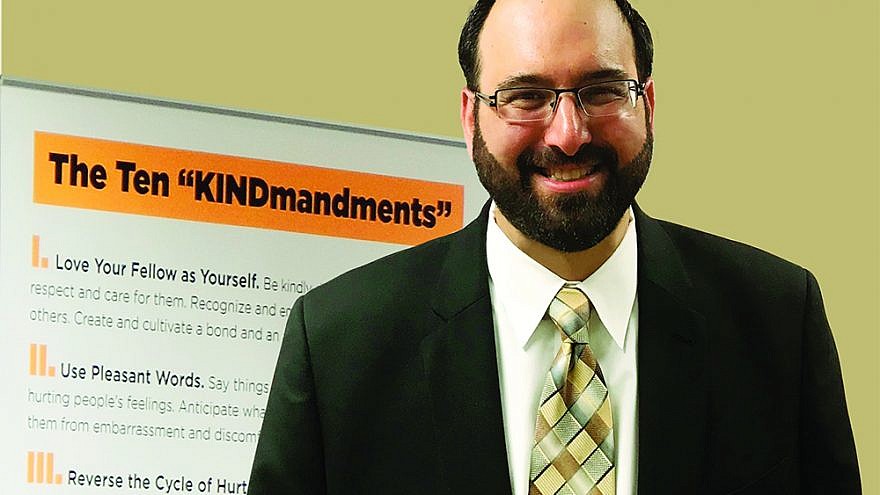Twenty years ago, Detroit-area Rabbi Tzvi Muller, at the time a yeshivah student in Israel, had a chance encounter on a Jerusalem street that shook up his Jewish conceptions—and forever altered the course of his life.
This brief conversation with a random stranger sent Muller on what has turned out to be a decades-long quest to enhance the way Judaism’s Golden Rule—to “love your neighbor as yourself”—is understood and applied in everyday life.
After explaining his desire to learn about Judaism, the backpacker asked Muller, a New York-born rabbinic student and himself the grandson of Holocaust survivors, what he had been studying that day in yeshivah.
Muller was crestfallen. His class had spent all day learning how to distinguish which spots on an etrog made the lemon-like fruit unfit for ritual use on Sukkot. But, he thought, how could these super-specific details be meaningful to a man who knew absolutely nothing about Judaism?
“Fortunately, I had an elective study session that afternoon with a friend,” Muller recalled, “and we had studied Chofetz Chaim, the book on lashon hara, which details how not to harm others with hurtful language.”
“I told the backpacker about it, and he melted; he was literally blown away by the Jewish emphasis on kindness,” Muller said. “The young man gushed, ‘That’s what Judaism teaches? It is so beautiful!’ ”
The young man left, feeling greatly enlightened. But Muller walked away from the incident profoundly disturbed that he had nearly missed an opportunity to inspire someone about the richness of his Jewish heritage.
“I knew there are thousands and thousands of details on how to observe Shabbos, and hundreds involving the etrog,” he said. “On the other hand, while Judaism puts the ideal ‘love your neighbor as yourself’ on a pedestal, when it came to how to actually practice it, it seemed just a nice, amorphous, generalized concept. It occurred to me: ‘Why aren’t there so many details guiding us on how to do it?’
“I went to my rabbinic mentor, who encouraged me to do research,” related Muller. “What I discovered blew my mind.
“The Talmud and its sister bodies of work are saturated with teachings of kindness. However, they were interspersed throughout many areas and not organized in a single place. But once you know they’re there and you put them all together, you find a very rich body of knowledge.”
A summary guide on interpersonal relationships
While in Israel, Muller raised funding and organized a team of scholars who produced a seven-volume encyclopedic work in Hebrew on the Jewish teachings of interpersonal relations.
But he realized that he had a much harder task ahead of him—to make this knowledge accessible to all Jews—not only to scholars, but also to those who cannot even read Hebrew. “This is their heritage, too,” he thought.
“What I discovered was a historic opportunity to compile and convey the Jewish concept of kindness that hadn’t presented itself for many hundreds of years.”
Thus arose Muller’s mission. And he’s continued this quest by teaching about kindness for the past 11 years in the Detroit metropolitan area, continually fine-tuning the communication of this body of knowledge.
Muller created the nondenominational Jewish Values Institute (JVI) in Bloomfield Hills, Mich., as a means to instruct in the ways of kindness, ethics and mindfulness. One goal of his is to get funding to hire a professional curriculum writer to make the coursework accessible to Jewish educators across America and beyond. He recently formulated the “Ten KINDmandments” (in the spirit of the “Ten Commandments”) that provide a summary guide on how to live a life of kindness in interpersonal relations.
Muller’s “Ten KINDmandments” are:
- Love Your Fellow as Yourself
- Use Pleasant Words
- Reverse the Cycle of Hurt (Seek conciliation and forgive others, if appropriate)
- Give the Benefit of the Doubt
- Be Helpful and Considerate
- Respect Others’ Good Will (Don’t seek others’ sympathy or friendship under false pretenses).
- Be Truthful
- Provide Corrective Feedback and Advice
- Preserve Others’ Reputations
- Perform Charity
‘Respecting our own inner humanity’
Muller sees dual benefits in improving one’s interpersonal relations. “When we act with kindness,” he said, “it affirms the respect we have for others. At the same time, we are also respecting our own inner humanity—the voice of goodness within us.”
In addition to directing the Jewish Values Institute, Muller, 42, the husband of Rachaeli and father of six, serves as pulpit rabbi at the nearby Birmingham-Bloomfield Chai Center synagogue.
Jerry and Eileen Borsand of Bloomfield Hills are founders of the congregation, as well as the nearby Blumenstein Jewish learning Center, where JVI has offices. “We are very fortunate to have Rabbi Muller because he is an amazing spiritual leader and such a dedicated, sincere and genuine person,” said Eileen Borsand.
At JVI, Muller teaches a series on kindness with topics like “Judging Others Favorably,” “Speaking the Truth” and “Bearing a Grudge and Revenge.” Students at his lectures learn the essence of kindness from the ancient texts of Jewish sages, as well as from the rabbi’s sharp wit.
“Some things in life come with accompanying instructions, from coffeemakers to our roads with speed-limit signs” explained Muller. “But for the most important areas of our lives—our relationships, our choices about goodness, our own character development—we don’t have signs popping up, giving us guidance what to do.
“We don’t hear a whisper in our ear, ‘apologize now for what you just said.’ We don’t have a sign pop up and say, ‘compliment that kid, he just did something extraordinary.’
“The way we can live a life that reflects our values is if we take the time to ponder, think and prepare ourselves by precisely studying the things that we study here—life’s most important instructions.”
Students of the rabbi agree.
Joe Falik of Huntington Woods, Mich., said “many people might think that kindness is obvious, but you need to study the texts Rabbi Muller provides us.”
Michael Gerber of Waterford, Mich., noted that “Rabbi Muller makes us aware of how we can might inadvertently hurt people, how to avoid it, and how we can be better parents, spouses and friends.”
And Reva Klar of West Bloomfield, Mich., also found value. “I always learn something in Rabbi Muller’s class that helps me become a better person.”
For more information, email JewishValuesInstitute@gmail.com or visit Jewish Values Institute on Facebook. For a laminated copy of the “Ten KINDmandments” with annotations, send your street address to JewishValuesInstitute@gmail.com.


























